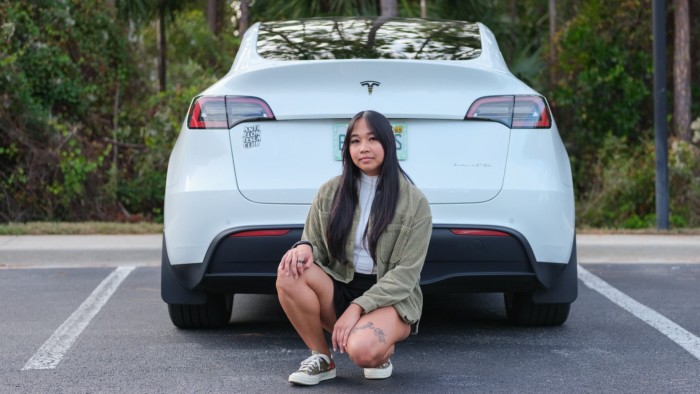When Joe Sipher bought a Tesla in 2011, there were so few people on the road when drivers passed each other that they waved at them. He had the car for eight years, loved it and never thought about Elon Musk.
Those days are over. Sipher, who replaced that first car with a Model Y two years ago, said that when his lease ended in May, he was unlikely to stay with the company. He recently invested $1,000 in a Lucid Gravity, which he says wouldn’t have happened if Elon Musk’s support for President-elect Donald Trump hadn’t bothered him enough to explore other options.
Sipher, a San Diego resident, said he is not one to take public political positions, and the very public positions taken by Musk ” – Tesla’s divisive CEO, love him or hate him – makes it impossible for him, as a consumer, to keep his own opinions private.
“Own a Tesla it’s like wearing a Maga hat,” he said. “No matter what political party I belong to, I don’t think businesses should take sides. . . Being this politically involved requires me to make a political statement about my choice of car, and I don’t want that.
Tesla is by far the best-selling electric vehicle brand in the United States. Although electric vehicles make up only 10% of new cars sold in the country, Teslas make up about half of that. The company sold just under 655,000 cars in the United States in 2023, according to Kelley Blue Book. General Motors, which had the second highest sales volume, sold just under 76,000.
Until recently, Tesla was considered a more “liberal” brand, as switching to greener energy sources is essential to combating climate change. But some consumers have cooled the brand as Musk has taken increasingly right-wing and conspiratorial stances on his social media platform, pumped more than 250 million dollars in the Trump campaign.
Since the election, Trump has appointed Musk to help run the so-called efficiency of government departmenta plan to cut $2 trillion from the federal budget.
Tesla sold just over 471,000 cars in the first three quarters of 2024, down 5% from the same period a year earlier, as the company’s key products aged and the car market electric vehicles has become more crowded.
Musk’s image is also a factor – positive for some and negative for others. In August, automotive research group Edmunds surveyed vehicle owners who said they planned to buy a car in the next 12 months. Among those considering an electric vehicle, 36 percent said Musk made them less likely to buy a Tesla, 37 percent said he made them more likely to buy a Tesla and 27 percent said it had not influenced their opinion of the brand. Among all car buyers, only 2% said they hadn’t heard of Musk.
Florida’s Loren Repollo said she was unlikely to buy another Tesla unless Musk’s public persona comes down to promoting environmentalism. Repollo bought him a Tesla in December 2021 – his first major purchase as an adult. She wanted an electric vehicle and was impressed by Tesla’s range. Although she thought Musk was “out of touch” like other billionaires, she found his behavior increasingly off-putting after he bought Twitter, which he renamed X, and that feeling intensified this summer when he started campaigning for Trump.
“Once he started getting more politically involved, I was like, ‘Oh my God, I have to sell my car,'” she said. “I can have no affiliation with him.”
Instead, she bought an “Anti-Elon Tesla Club” bumper sticker for the car, as well as one for her mother.
Matthew Hiller is the man behind the bumper sticker. Hiller was considering buying a Tesla until Musk changed his mind. But he believed many Tesla owners had made a purchase and perhaps wanted to express their displeasure. He was already producing fish stickers for his Etsy store, Mad Puffer Stickers, so he added his first bumper sticker: “I bought this before Elon went crazy. »

He sold 300 stickers the day after the election, his best sales day ever. Previously, he averaged around 50 sales per day. Since November 6, it has been approaching 100 per day.
“People who buy Tesla now know who he is,” he said. “So that’s absolutely going to affect its sales, because traditionally they were always liberal cars. And now ? . . . I don’t know how he will manage to play for his new base.
Anna Wilk, who lives outside London, said she would have to think seriously before buying another Tesla. A self-described “Tesla head,” she was never a fan of Musk, but saw him as separate from the product her company made. She helped persuade several family members and friends to buy the cars.
But as someone born in Poland, she is wary of how Musk and Trump could be influenced by their contacts with Russia’s Vladimir Putin.
“There is a huge disconnect between values,” she said. “I’m not sure what I’m going to do once my car rental contract ends.”
“Mixing politics and business is not a good idea,” she added. “There is always something wrong.”
Humaira Ahmed and her husband discussed selling their Tesla, even if it’s at a loss. A tech entrepreneur who respected Musk’s record of innovation, Ahmed said she was excited in 2020 to own the first Tesla in her region, Vancouver Island. Now she feels like driving suggests she shares Musk’s political views, which is not the case.
“We really enjoyed it, and still do, and that’s the hardest part,” she said. “I don’t talk about cars anymore. It was a source of pride.
She’s not the only Tesla owner hesitant to mention her vehicle. Four other people declined to be interviewed for this story because they feared consequences for Musk’s criticism, including a backlash online.


